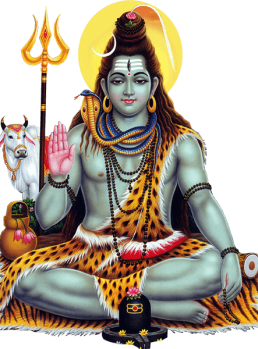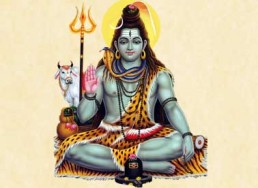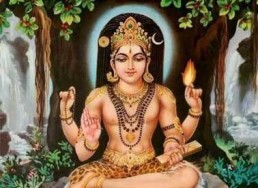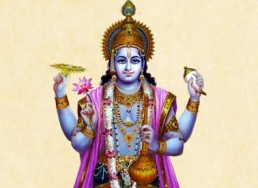Bhoothanath Ashtakam
नव नव नित्यनृत्यं ताण्डवं तं तन्नादम्
घन घन घूर्णिमेघं घंघोरं घंन्निनादम्
भज भज भस्मलेपं भजामि भूतनाथम् ॥१॥
nava nava nityanṛtyaṃ tāṇḍavaṃ taṃ tannādam
ghana ghana ghūrṇimeghaṃ ghaṃghoraṃ ghaṃnninādam
bhaja bhaja bhasmalepaṃ bhajāmi bhūtanātham ..1..
He performs the ever-new and eternal cosmic dance (Tandava), creating the primordial sound (nāda).
His presence is like a dark, swirling storm cloud, producing terrifying, deep sounds of thunder.
I worship him, who is smeared with sacred ash (bhasma), the Lord of all beings (Bhoothanatha).
डम डम डमनादं डम्बुरुं डंकनादम्
सम सम शक्तग्रिवं सर्वभूतं सुरेशम्
भज भज भस्मलेपं भजामि भूतनाथम् ॥२॥
ḍama ḍama ḍamanādaṃ ḍamburuṃ ḍaṃkanādam
sama sama śaktagrivaṃ sarvabhūtaṃ sureśam
bhaja bhaja bhasmalepaṃ bhajāmi bhūtanātham ..2..
He makes the resonating sound of the Damaru drum, creating the powerful, rhythmic beat that reverberates through the cosmos.
He bears the garland of Shakti, the embodiment of power, and is the Lord of all beings and gods.
I worship him, smeared with sacred ash, the Lord of all beings (Bhoothanatha).
मम मम मुक्तहस्तं महेशं मं मधुरम्
बम बम ब्रह्मरूपं बामेशं बं विनाशम्
भज भज भस्मलेपं भजामि भूतनाथम् ॥३॥
mama mama muktahastaṃ maheśaṃ maṃ madhuram
bama bama brahmarūpaṃ bāmeśaṃ baṃ vināśam
bhaja bhaja bhasmalepaṃ bhajāmi bhūtanātham ..3..
He holds his hand in blessing, offering liberation, and is the great Lord (Mahesha), whose nature is sweet and gentle.
He is the embodiment of Brahman (the supreme reality) and is the Lord of the left-hand path (Bamesha), who destroys all that is impure.
I worship him, smeared with sacred ash, the Lord of all beings (Bhoothanatha).
खम खम क्षमाशीऴं सपापं खं क्षमणम्
द्दग द्दग ध्यानमूर्त्तिं सगुणं धं धारणम्
भज भज भस्मलेपं भजामि भूतनाथम् ॥४॥
khama khama kṣamāśīḻaṃ sapāpaṃ khaṃ kṣamaṇam
ddaga ddaga dhyānamūrttiṃ saguṇaṃ dhaṃ dhāraṇam
bhaja bhaja bhasmalepaṃ bhajāmi bhūtanātham ..4..
I worship Shiva, beloved of Vishnu (Haripriya), who destroys the threefold sufferings (physical, mental, and spiritual) and removes all sorrows.
He is patient and forgiving, pardoning even the sinful, and is the embodiment of compassion and forgiveness.
He is the form of deep meditation, manifesting with attributes (Saguna), and the one who sustains all through deep concentration (dharana).
I worship him, smeared with sacred ash, the Lord of all beings (Bhoothanatha).
This verse reflects Shiva’s close connection with Vishnu, his role as the destroyer of suffering and the merciful forgiver of sins. It also highlights his association with meditation and as the sustainer of all through dharana (concentration).
गम गम गुह्यतत्त्वं गिरीशं गं गणानाम्
दम दम दानहस्तं धुन्दरं दं दारुणम्
भज भज भस्मलेपं भजामि भूतनाथम् ॥५॥
gama gama guhyatattvaṃ girīśaṃ gaṃ gaṇānām
dama dama dānahastaṃ dhundaraṃ daṃ dāruṇam
bhaja bhaja bhasmalepaṃ bhajāmi bhūtanātham ..5..
He reveals the hidden truths and mysteries of existence, and is the Lord of the mountains (Gireesha) and the leader of the Ganas (celestial attendants).
He holds the hand of generosity, giving boons, yet remains fierce and formidable in his appearance.
I worship him, smeared with sacred ash, the Lord of all beings (Bhoothanatha).
टम टम रूंडमाऴं टंकारं टंकनादम्
भम भम भ्रम् भ्रमरं भैरवं क्षेत्रपाऴम्
भज भज भस्मलेपं भजामि भूतनाथम् ॥६॥
ṭama ṭama rūṃḍamāḻaṃ ṭaṃkāraṃ ṭaṃkanādam
bhama bhama bhram bhramaraṃ bhairavaṃ kṣetrapāḻam
bhaja bhaja bhasmalepaṃ bhajāmi bhūtanātham ..6..
He wears a garland of skulls (Rūṇḍamāla) and resonates with the mighty sound of Ṭanka (a resounding roar).
He moves like a whirling bee (Bhramara) and takes on the fearsome form of Bhairava, the protector of sacred places (Kṣetrapāla).
I worship him, smeared with sacred ash, the Lord of all beings (Bhoothanatha).
पार्वतीपति त्वम् मायापति शुभ्रवर्णम् महेश्वरम्
कैऴाशनाथ सतीप्राणनाथ महाकालम् कालेश्वरम्
अर्धचंद्रम् शिरकिरीटम् भूतनाथं शिवम् भजे ॥७॥
pārvatīpati tvam māyāpati śubhravarṇam maheśvaram
kaiḻāśanātha satīprāṇanātha mahākālam kāleśvaram
ardhacaṃdram śirakirīṭam bhūtanāthaṃ śivam bhaje ..7..
You are the consort of Parvati, the Lord of illusion (maya), fair-complexioned, and the great Maheshvara.
You are the Lord of Kailasa, the life force of Sati, the great destroyer (Mahakala), and the master of time (Kaleshvara).
Wearing the crescent moon on your head as a crown, I worship Shiva, the Lord of all beings (Bhoothanatha).
यक्षरूपाय जटाधराय नागदेवाय नमो नमः
इंद्रहाराय त्रिलोचनाय गंगाधराय नमो नमः
अर्धचंद्रम् शिरकिरीटम् भूतनाथं शिवम् भजे ॥८॥
yakṣarūpāya jaṭādharāya nāgadevāya namo namaḥ
iṃdrahārāya trilocanāya gaṃgādharāya namo namaḥ
ardhacaṃdram śirakirīṭam bhūtanāthaṃ śivam bhaje ..8..
Salutations to the blue-throated one (Nilakantha), the embodiment of truth and the eternal auspicious one.
Salutations to the one in the form of a Yaksha, with matted locks, and the deity of serpents (Naga).
Salutations to the one adorned with Indra’s garland, the three-eyed one (Trilochana), and the one who holds the Ganges (Gangadhara).
Wearing the crescent moon on your head as a crown, I worship Shiva, the Lord of all beings (Bhoothanatha).
This verse focuses on Shiva’s unique attributes: his blue throat, symbolizing his act of drinking the poison during the ocean churning, and his eternal truth as Sada Shiva. Shiva is depicted as a Yaksha, a celestial being, and is connected with serpents and the holy Ganges flowing from his matted locks. The verse again highlights his cosmic powers through his third eye and the crescent moon, establishing him as the Lord of all beings, Bhoothanatha.
तव कृपा कृष्णदासः स्मरति भूतनाथम्
तव कृपा कृष्णदासः पश्यति भूतनाथम्
तव कृपा कृष्णदासः पि वति भूतनाथम् ॥9॥
tava kṛpā kṛṣṇadāsaḥ smarati bhūtanātham
tava kṛpā kṛṣṇadāsaḥ paśyati bhūtanātham
tava kṛpā kṛṣṇadāsaḥ pi vati bhūtanātham ..9..
By your grace, your devotee Krishnadasa remembers Bhoothanatha.
By your grace, your devotee Krishnadasa sees Bhoothanatha.
By your grace, your devotee Krishnadasa drinks the essence of Bhoothanatha.
पठति निस्कामभावेन सः शिवलोकं सगच्छति ॥
paṭhati niskāmabhāvena saḥ śivalokaṃ sagacchati ..

Description
Bhoothanath Ashtakam
The Bhoothanatha Ashtakam composed by Shri Krishnadasa is a devotional hymn that glorifies Lord Shiva in his form as Bhoothanatha, the Lord of all beings, spirits, and the cosmos. Each verse highlights various aspects of Shiva’s powers, his cosmic role, and his deep connection with his devotees. The hymn reflects the themes of protection, destruction, transformation, and the ultimate grace of Shiva.
Key Themes:
- Shiva as the Cosmic Destroyer: Shiva is portrayed as the wielder of the trident and the bringer of cosmic destruction, yet his destruction is part of the natural cycle of creation and renewal. His form as Mahakala, the master of time, shows his role in the cyclical process of birth, death, and rebirth.
- Shiva as the Compassionate Protector: Despite his fearsome forms, Shiva is also depicted as the protector of devotees. He is the loving consort of Parvati and is worshipped as the one who grants grace and spiritual liberation to his followers.
- Shiva’s Divine Attributes: The hymn emphasizes his distinctive attributes: the blue throat (Nilakantha) from drinking poison, the third eye that symbolizes spiritual vision, and the crescent moon adorning his head, which represents control over time and immortality.
- Yaksha and Nagas: Shiva is associated with the celestial beings (Yakshas) and the serpents (Nagas), which are symbols of wisdom, strength, and mystery. His connection with nature and the elements is profound.
- The Devotee’s Journey: The hymn reflects the journey of Krishnadasa, the devotee, who experiences the grace of Shiva in worship, remembrance, and divine vision. By Shiva’s grace, Krishnadasa attains spiritual nourishment and liberation.
- Promise of Liberation: The hymn concludes by assuring that those who recite it with a pure, desireless heart will be blessed with entry to Shivaloka, Shiva’s abode. This highlights the spiritual benefits of devotion and surrender to Lord Shiva.
Overall Message:
The Bhoothanatha Ashtakam is a powerful hymn that combines reverence for Shiva’s formidable, cosmic powers with a deep, personal devotion. It shows how, through Shiva’s grace, devotees can overcome worldly struggles, receive spiritual nourishment, and ultimately attain liberation. The hymn presents Shiva as the destroyer and protector, embodying both fearsome and compassionate aspects, with the devotee’s unconditional surrender at its core.
Other Shiva Shlokams
Aksharamalika Shiva Stotram
Also called the Shiva Akshara Mala Stotram, this is a very popular prayer addressed to Lord Shiva. Each verse starts in the order of alphabets in Sanskrit.
Anayasena Maranam
O Lord Shiva, please grant me a peaceful death without pain (Anasayena Maranam), a life without any trouble or dependence on others for my basic needs (Vina Dhainyena Jeevanam) and a life filled with
Ardha Narishvara Stotram
Shri Ardhanareeshwara Stotram was composed by Sri Adi Shankara bhagavatpada. Creator and Creation are One ~ Ardhanarishwara, composite of Shiva and Shakti together in one body.
Bilvashtakam
Composed by Sri Adi Shankaracharya, the famous Bilvashtakam extols the virtues of the Bilva leaf (also spelt Vilva, Bilwa) and Lord Shiva’s love for it. The following com
Bilvashtakam 14 Verses
Note: For the original version of Bilvashtakam please click here. Composed by Sri Adi Shankaracharya,
Chandrashekhara Ashtakam
Chandrashekhara Ashtakam is a divine hymn to praise God Shiva as Chandrasekhara, the lord who is adorned with moon on his head (Chandra – moon, Sekhar – crown) and to seek refuge from untimely death.
Dakshinamurthy Stotram
Shlokams,Sankara,Shiva,Dakshinamurthy
The Dakshinamurti Stotra is a Sanskrit religious hymn to Shiva by Sri Adi Shankaracharya. It explains the metaphysics of the universe in the frame of the tradition of Advaita V
Ishvaro Guru Atmeti
Shlokams,Shiva,Dakshinamurthy,Guru,Sankara
Salutations to Lord Dakshinamurti, who is all-pervasive like space but who appears (as though) divided as Lord, Guru, and the Self.
Kalabhairava Ashtakam
Composed by Sri Adi Shankaracharya. The hymn illustrates the personality of Kala Bhairava of Kashi, the God of Death(kala). Those who study these 8 verses on Kala Bhairava, which are enticing and whic
Karacharana Kritam
O Lord, kindly forgive all the wrong acts and omissions I have committed, whether I committed them knowingly or unknowingly, with my hands, feet, words, ears, eyes, or mind. Glory to you, Mahadeva, wh
Karpura Gauram
Pure white like camphor, an incarnation of compassion, the essence of worldly existence, whose garland is the king of serpents, always dwelling inside the lotus of the heart. I bow to Shiva and Shakti together
Kasi Viswanathashtakam
Composed by Sri Adi Sankaracharya in praise of Lord Shiva. That man who reads this octet with its meaning, which sings the praise of Shiva who is the lord of Varanasi, would get knowledge, wealth, gre
Lingashtakam
The Lingashtakam is one of the most popular Ashtakams(a Stotram with 8 verses) dedicated to Lord Shiva which praises Him in the abstract "Lingam" form.
Maha Shivaratri
Significance of Ganesh Puja, Vinayaka Chavithi or Chathurthi. See how to prepare for Ganesha Pooja, How to perform the Puja with Video instructions and enjoy Audio devotional songs, uninterrupted and without ads.
Mantra Pushpam
The Mantra Pushpam (literally translating to "Flower of Mantras") is a collection of sacred verses from the 10th chapter of Taittiriya Aranyaka of Krishna Yajur Veda. Each verse begins with an exploration of the relationship between the flower of…
Margabandhu Stotram
This great Stotra Rathna was written by Appayya Deekshitha(1520-1593). He was one of the great interpreter of Advaitha Sidhantha after Adi Sankara. This stotra is written in praise of the Lord Margaba
Mauna Vyakhya
Shlokams,Sankara,Shiva,Dakshinamurthy
I salute Sri Dakshinamurti, who is not subject to time, who makes known the truth of Brahman through the implied meaning of words, who is surrounded by disciples who are themselves Rishis and committe
Mruthyunjayaya Rudraya
Salutation to you Mrithyunjaya, Rudra, Nilakanta, Shambhu & the lord of immortals and this great lord of all beings.
Namaste astu bhagavan
Morning prayer. From Devi Mahatmyam. The Devi Mahatmyam is a Hindu religious text describing the Goddess as the supreme power and creator of the universe. It is part of the Markandeya Purana, and esti
Nidhaye Sarvavidyanam
Shlokams,Sankara,Shiva,Dakshinamurthy
Salutations to Sri Dakshinamurti, the reservoir of knowledge (the abode of all learning), the healer of all those who suffer from the disease of samsāra, and the teacher of the whole world.
Om Namah Pranavarthaya
Shlokams,Sankara,Shiva,Dakshinamurthy
Om. Salutation to the one who is the meaning of praņava, who is in the form of pure knowledge, who is taintless and who is free from any change. To that Sri Dakshinamurti, (my) salutations.
Om Namo Bhagavate Dakshinamurthaye
Shlokams,Sankara,Shiva,Dakshinamurthy
Om. Salutations to Bhagavan Dakshinamurti. (Oh Lord) Bless me with memory, the capacity to think properly, and clarity, wisdom.
Rudram Chamakam
The Chamakam portion of the Sri Rudram is a profound and structured Vedic prayer that follows the Namakam, extending the worship of Lord Rudra (Shiva) by asking for blessings and the fulfillment of various needs. Unlike the Namakam, which focuses on…
Rudram Chamakam Meaning
The Chamakam portion of the Sri Rudram is a profound and structured Vedic prayer that follows the Namakam, extending the worship of Lord Rudra (Shiva) by asking for blessings and the fulfillment of various needs. Unlike the Namakam, which focuses on…
Rudram Laghunyasam
Laghunyasam is a preliminary Vedic chant traditionally recited before performing the Sri Rudram to purify and align the body, mind, and spirit with divine energy. The term "Nyasam" refers to a process of mentally assigning or dedicating various…
Rudram Laghunyasam Meaning
Laghunyasam is a preliminary Vedic chant traditionally recited before performing the Sri Rudram to purify and align the body, mind, and spirit with divine energy. The term "Nyasam" refers to a process of mentally assigning or dedicating various…
Rudram Namakam
The Namakam portion of the Sri Rudram, also known as the Rudra Prashna, is a profound and intricate Vedic hymn found in the Krishna Yajurveda, specifically within the Taittiriya Samhita (Book 4, Chapter 5). The term Namakam is derived from the…
Rudram Namakam Meaning
The Chamakam portion of the Sri Rudram is a profound and structured Vedic prayer that follows the Namakam, extending the worship of Lord Rudra (Shiva) by asking for blessings and the fulfillment of various needs. Unlike the Namakam, which focuses on…
Rudrashtakam
The famous Rudrashtakam extols the many qualities of Shiva. This is composed by Sri Goswami Tulsidas. Rudra is considered as the fearsome manifestation of Shiva. Rudrashtakam has its origins in the Ra
Shambu Devam Sakalajagatam
I sing in praise of God Shambhu, the Lord of all worlds, and the three-eyed one; the consort of Gauri, the grantor of happiness, blessings and gifts, the one with the moon as his crest-jewel.
Shambu Stuti
A stuti on lord Shiva composed by lord Rama himself. Lord Rama recites this at Rameshwaram when faced with the near impossibility of crossing the vast ocean to reach Lanka, he prayed intensly to Lord
Shiva Aparadha Kshamapana Stotram
The Śiva Aparādha Kṣamāpaṇa Stotram, or "Hymn of Forgiveness for Offenses to Lord Śiva," is a heartfelt composition by the revered philosopher and saint Śrī Ādi Śaṅkarācārya. T
Shiva Ashtakam
Composed by Adi Shankaracharya. This ashtakam is a descriptive salutation of the different attributes of Shiva. The great yogi who is referred to as Ardhanarishwara (the one who has included the femin
Shiva Mahimna Stotram
The Shiva Mahimna Stotra is very popular among the devotees of Lord Shiva and is considered one of the best among all Stotras (or Stutis) offered to Lord Shiva. The legend abou
Shiva Mahimna Stotram Meaning
The Shiva Mahimna Stotra is very popular among the devotees of Lord Shiva and is considered one of the best among all Stotras (or Stutis) offered to Lord Shiva. The legend abou
Shiva Manasa Puja
Sri Adi Shankaracharya composed this mantra for lord Shiva. Using this stotra, we can perform mental worship of Lord Shiva.
Shiva Panchakshara Stotram
The famous Shiva Panchakshara Stotram praises Shiva and the power of the five sacred syllables, na-ma-shi-va-ya.
Shiva Pratah Smaranam
This is a short and beautiful 'Three Shloka Prayer' that makes the start of the day full of energy and happiness. Composed by Sri Adi Shankaracharya.
Shiva Sahasranama Stotram
Also called the Shiva Akshara Mala Stotram, this is a very popular prayer addressed to Lord Shiva. Each verse starts in the order of alphabets in Sanskrit.
Shiva Shadakshara Stotram
In this Hexa-Syllabic Hymn, there is a single stanza mantra for each letter of Aum-Na-Ma-Shi-Va-Ya. This mantra is found in Rudrayamala Tantra text.
Shiva Tandava Stotram
Shiva Tandava Stotram The Shiva Tandava Stotram is a deeply powerful and rhythmic hymn that glorifies Lord Shiva's cosmic dance, known as the Tāṇḍava. It is traditiona
Tatpurushaya Vidmahe Rudra Gayatri Mantra
Om. May we know that Lord Isvara, for which may we meditate upon Mahadeva. May that Rudra impel us (towards him).
Tryambakam Yajamahe
We worship Lord Shiva the three-eyed one, the one who is the master of all senses and qualities and the one who is the sustainer of all growth. May he release us from the bondage of death, just as a r
Vagarthaviva Sampruktau
Kalidasa prays to the divine parents Paarvathi & Parameshwara who are inseparable like the word and its meaning, in order to guide him in acquiring the power of words and their meanings (literature) as he embarks on the Mahakavya, Raghuvamsa.
Vande Shambu Umapatim
I salute Shambu, Umapati, the preceptor (teacher) of devas, I salute the cause of the earth, I salute the one ornamented with the serpent, the wearer of the moon, I respect that master of all beings.
Vedasara Shiva Stava
Vedasara Shiva Stava: The Essence of Vedic Wisdom The Vedasara Shiva Stava is a beautiful 10-verse hymn written by Adi Shankaracharya in praise of Lord Shiva. The name
Bhoothanath Ashtakam – Shiva – Bhoothanath Ashtakam – Full text and lyrics with audio in Sanskrit, English, Telugu, Kannada, Tamil and more



